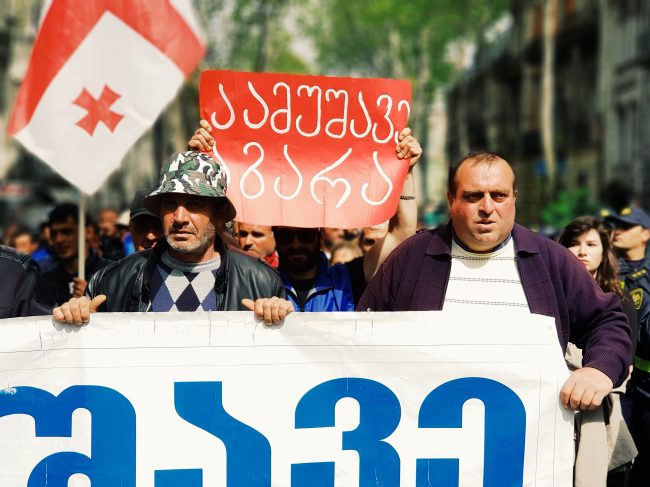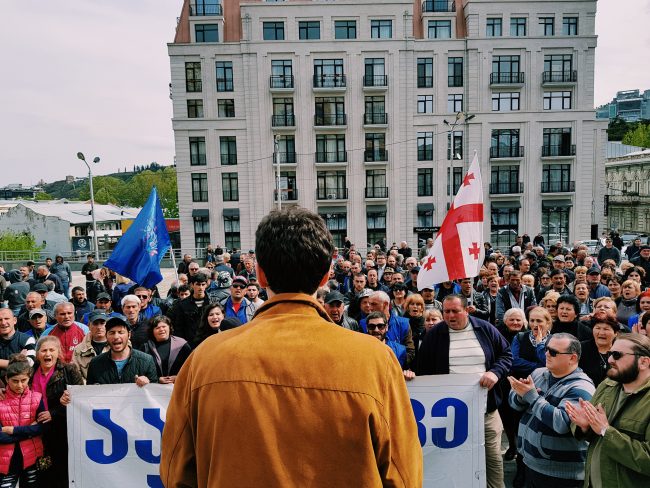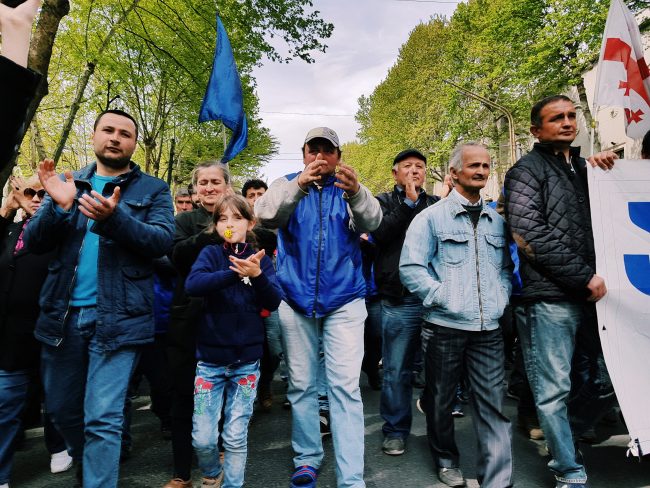
Pro-government media, MPs, and Patriarchate attack Tbilisi theatre’s ‘blasphemous’ play
The Royal District Theatre, which staged the play, is known for its outspoken stance during ongoing anti-government protests.



Several dozen workers from a sugar factory in the town of Agara, west of Tbilisi, have marched 110 kilometres to the capital and are demonstrating outside the Government Chancellery building. The factory suspended operations in November after the company claimed their sugar was no longer competitive amidst growing imports from Europe.
The demonstrators from Agara, in Kareli Municipality, have said the factory is the only source of income for the town, and that up to 500 people will be left unemployed if it does not reopen. Protesters had been demonstrating outside the factory for over a month, demanding the government step in to save it.
Dozens gathered outside the Chancellery in Tbilisi on Friday at a demonstration in support of the workers, including rights activists and trade union employees. ‘Revive Agara’ demonstrators chanted, demanding officials tell them ‘how to survive’.
‘We’ve spent six harsh months together. These were bitter times of unemployment. We have stood for two months [protesting] in front of the factory. I often get asked how did we survive, and I answer — by standing together. The government should tell us how to support our families. We’ve had coworkers who were paid as little as ₾180, meanwhile the government is discussing whether they should have white cars instead of black ones’, one factory worker told OC Media at the demonstration.


The Agara sugar factory suspended operations in November 2017. The factory’s administration claimed the sugar they were producing was no longer competitive amidst growing imports from Europe, after the authorities lifted a quota on white sugar imports.
‘Growing distribution of white sugar globally resulted in a reduction in prices. Our sugar wasn’t able to compete against imported sugar because unlike the prices, material costs have not dropped and production prices have remained the same for the factory’, a statement from the Agara Sugar Company issued on 19 April said.
Workers have for 48 days been demanding the government step in to reopen the factory. After struggling to get attention from officials, they said they decided to march from Agara to Tbilisi by foot.
Photos posted on Facebook showed one of the marchers with blisters on his feet, and ambulances were called several times during the march.
‘The people of Agara have been doomed to famine due to the economic and social reality we live in. It’s a shame when foreign products are so strong on the market that a local factory has to close down. Most importantly, nobody has answered these people and told them how they should survive, there has been zero communication’, the head of the Georgian Trade Union Confederation, Irakli Petriashvili told demonstrators.


(Dato Parulava /OC Media)

Lina Gvinianidze, a lawyer from the Human Rights Education and Monitoring Centre (EMC) told OC Media that the government should have a plan for the ‘social crisis’ taking place in Agara. She said officials have to come up with both a short-term and long-term plan.
‘A short-term plan could be the reopening of the factory. As for the long-term plan, it should concern not only Agara, but all the other places where there is only one employer. The government has no plan for developing such towns’, Gvinianidze said.
She said it was not clear whether the crisis in Agara was caused by the government lifting quotas on imports.
‘This has not been confirmed as a fact yet. There has been no discussion regarding the economic factors, imports, or production profitability, making it hard to say whether this is the cause of the crisis. And if it is, the government should be ready to act because it is authorised to make regulations’, Gvinianidze told OC Media.
On 14 April, Deputy Business Ombudsman Levan Kalandadze said the government had already started negotiating with investors regarding reopening the factory.
‘We also spoke with the banks. We agreed that for people who have financial problems, loan payments will be deferred for 6 months to reduce financial pressure on them’, Kalandadze said.
Factory workers were continuing their protest in front of the Government’s Chancellery building on Friday evening, and said they would wait for officials to answer their questions. Some said they would stay outside the building overnight if officials did not respond.